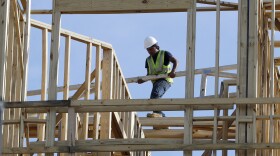Need more evidence that the U.S. economy is moving on two tracks? A new Harvard Business School study, released Monday, may confirm your fears.
The report, "An Economy Doing Half Its Job," involved a survey of 1,947 alumni. The Harvard-educated business leaders expressed concerns about U.S. competitiveness in the global marketplace. But they were far more optimistic about the future for U.S. corporations than for that of workers, the survey showed.
About a third of respondents expect corporations to become more competitive within three years. Assessments of every element of the U.S. business environment improved between a 2011 survey and this latest one. The growing optimism "seems to reflect the cyclical rebound of the U.S. economy," the report said.
But what do business leaders see coming for workers in the next three years? Only 27 percent expect workers to enjoy higher pay, while 41 percent said wages and benefits would be falling.
That view seems to line up with recent history: In the past five years, the stock market's value has nearly doubled, while the median household income remains below pre-recession levels.
The study called the gap between the fortunes of companies and workers "unsustainable." It concluded that business leaders should engage in helping train workers to help them improve skill levels enough to justify higher wages.
"We see a need for business leaders to act — to move from an opportunistic patchwork of projects toward strategic, collaborative efforts that make the average American productive enough to command higher wages even in competitive global labor markets," the report said. "Without such actions, the U.S. economy will continue to do only half its job, with many citizens struggling."
Copyright 2021 NPR. To see more, visit https://www.npr.org. 9(MDAxNzg0MDExMDEyMTYyMjc1MDE3NGVmMw004))





